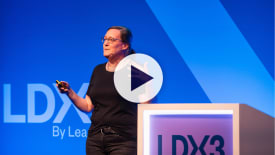
Latest
-

5 uncomfortable predictions for engineering leaders in 2026
Home truths, not pie-in-the-sky predictions.
-
AI-assisted coding and unsanctioned tools headline 2026’s biggest security risks
Predicting the biggest security threats in 2026.
-
How engineering leaders can better leverage AI in 2026
Supercharge your leadership next year with these AI-powered workflows.
-
Staff+ engineers are the key to AI adoption
As the organizational glue, staff+ engineers are best placed to bring in successful AI adoption.
-
Deliver meaningful feedback in the age of AI
What happens when we delegate one of the most human parts of the job to AI?
Editor’s picks

AI coding mandates are driving developers to the brink
Under pressure to embrace AI, developers are growing frustrated by misguided mandates and are left to clean up any collateral damage inflicted on their codebase.
Essential reading

The right way to make AI part of your tech strategy
With everyone scrambling to bake AI into their technical strategy, leaders may be resorting to unreliable and unscalable methods.

MCP and the future of AI tools
What is the Model Context Protocol (MCP) and how does it simplify data access, enhance AI reliability, and accelerate development?
On our AI playlist

FORTRAN’s AI Playbook: Leadership lessons from history
Learn proven leadership strategies from FORTRAN’s history to successfully adopt AI, upskill teams, and drive lasting transformation at scale

Measuring the impact of AI in engineering
Insights from LeadDev’s inaugural AI Impact Report.

From autocomplete to agents: AI coding assistance state of play
Everybody wants high reliability, but the path isn’t exactly clear. This talk is for people who need to know what works and what doesn’t.

Rethinking growing engineers in the age of AI
Explore how to grow future senior engineers in an AI-driven world that sidelines traditional junior roles.

Are you ready for AI agents?
AI is changing how apps get accessed – are your systems built to keep up?
More about AI
-
Why Zig is moving on from GitHub
A scathing review has broader implications for AI use by major platforms.
-
Roses are red, guardrails blind – a poem can warp an LLM’s mind
Study shows adversarial prompts hidden in poetic verse repeatedly dodge safety checks.
-
Amazon employees demand a voice in AI decisions amid layoff fears
1,000 Amazon employees’ signed a letter voicing their AI concerns, reflecting a growing tension across the tech industry.
-
Cover letters used to mean something
Research shows that AI-generated cover letters may be punishing good candidates.
-
Why AI economics are fundamentally broken
Making money from software is not the same equation in the AI era.
-
If 95% of generative AI pilots fail, what’s going wrong?
Learning the right lessons from that MIT study
Top AI videos
-

From autocomplete to agents: AI coding assistance state of play
Everybody wants high reliability, but the path isn’t exactly clear. This talk is for people who need to know what works and what doesn’t.
-

Documentation and AI: How to write right now
Think AI can handle your documentation? Sometimes. This talk breaks down where it helps, where it doesn’t, and what still needs the human touch.
-

Building the AI enablement playbook
Learn how to lead AI adoption by reshaping systems, culture, and operations, not just rolling out tools.
-

Rethinking collaboration: LLMs, teams, and cognitive load
Discover how LLMs can reduce cognitive load, boost team collaboration, and reshape engineering workflows without compromising quality or delivery.
-

Rethinking growing engineers in the age of AI
Explore how to grow future senior engineers in an AI-driven world that sidelines traditional junior roles.
-

Launching a Gen AI powered travel companion: A case for tiger teams
Explore Booking.com’s journey in launching a Gen AI travel companion in 3 months, powered by a tiger team approach for rapid, focused product development and innovation.
-

Scaling your ML platform to enable the industrialisation of AI and ML development
Delve into the essentials of scaling ML platforms to industrialize AI development, with insights on prioritizing tools and requirements for efficient, large-scale model deployment.
-

Beyond the hype: Practical steps to establishing and scaling your data & ML team
Discover how to build and scale a data team, implement practical machine learning, and drive success with data-driven decision-making in a growing company.


